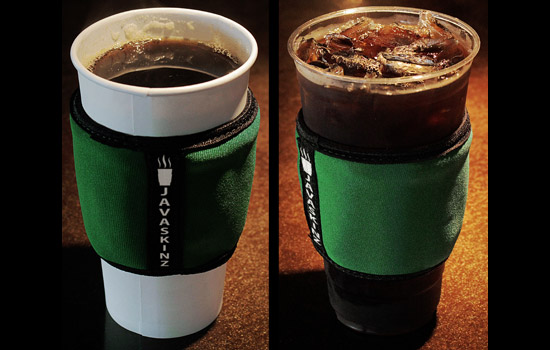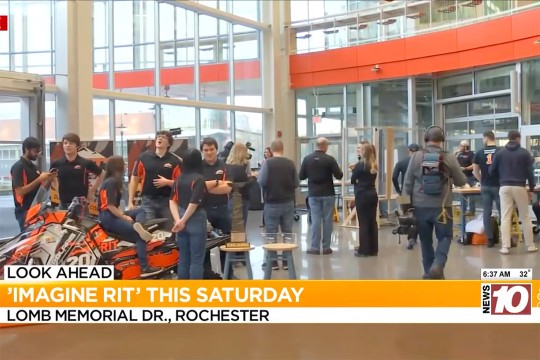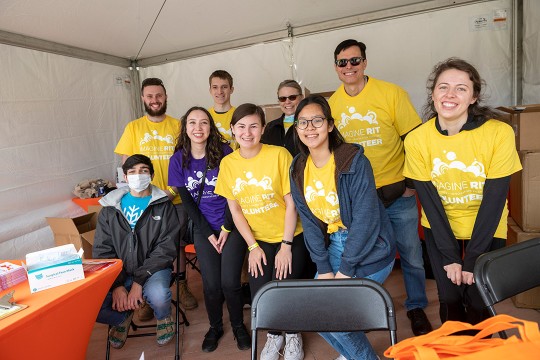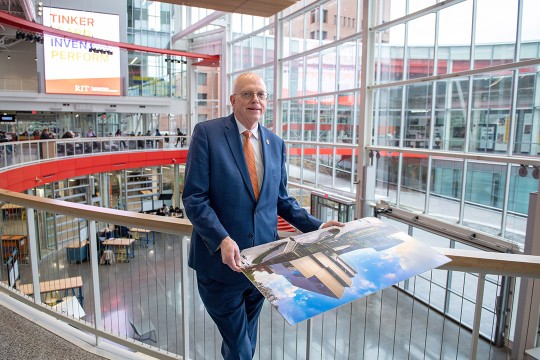Students develop sustainable beverage sleeves
JavaSkinz could provide option to decrease the amount of paper sleeves used for coffee on the go
RIT graduate students Michael Rodriguez and Harshil Sukhadia use high-tech, phase change material to retain heat or cool drinks as part of their new business venture, JavaSkinz.
Thousands of cups of coffee are served each day, from high-end baristas to homey cafes and diners. Two RIT students developed JavaSkinz, a durable coffee cup sleeve made of high-tech, phase-change material that can keep coffee warmer longer. It also has the potential to provide a cost effective and sustainable solution for coffee drinkers on the go by doing away with the paper sleeves now used for coffee cups.
Michael Rodriguez and Harshil Sukhadia, graduate students in RIT’s College of Applied Science and Technology, developed JavaSkinz, a concept the students proposed during an experimental methods class they took in winter quarter and advanced through the Applied Entrepreneurship and Commercialization class offered by the university’s Saunders College of Business.
Combining a bit of chemistry and a touch of physics with their idea for a product, the two developed a prototype that can maintain the temperature in hot or cold drinks for a longer period of time, Sukhadia explains. Made with neoprene, the same fabric used for wet suits, the JavaSkinz sleeve is placed around a take-out cup and has pockets where the phase change material packets are inserted. The phase change material thermal properties are different than those found in a vacuum thermos. A thermos acts as an insulator; the phase change material absorbs, stores and releases energy to maintain a constant temperature.
“We’re seeing 50 minutes versus 30 minutes for cup of coffee still being warm…almost twice as long,” says Rodriguez.
Rodriguez, from Cicero, N.Y., and Sukhadia, who is from Mumbai, India, will make JavaSkinz in six colors and expect to add more colors as they continue production. RIT student Jesse Radzikowski, a fifth-year mechanical engineering technology undergraduate, was brought on to help with the design and testing of JavaSkinz. Throughout the summer, he performed testing to prove the effectiveness of the product and characterize its performance.
During the new product development process, the students took advantage of entrepreneurial advice and support from several campus business resources. They received two grants of $400 and $1,000 from RIT’s Simone Center for Student Innovation and Entrepreneurship, as well as professional mentoring and temporary work space from the university’s Venture Creations organization, a business incubator. The student-team is putting the finishing touches on its business plan and seeking funding to begin production.
The student-entrepreneurs are also facing a challenge of raising awareness about their product in a broad consumer market where coffee is big business. In the U.S. alone, more than 400 million cups of coffee per day are consumed, according to the National Coffee Drinking Association—and many with a paper sleeve wrapped around the tall latte.
“You have to break a traditional notion. People are used to buying coffee cups with paper sleeves. Now we want you to buy a $10 JavaSkinz,” says Rodriguez. “How do we prove to people that we are adding value beyond the cost? Along with keeping drinks hot or cold and protecting drinkers in the process, JavaSkinz is eco-friendly, because now you are displacing thousands of paper sleeves with one JavaSkinz. It can last for years. Just think, if you have a cup of coffee a day, one paper sleeve a day, that’s mountains of paper.”















